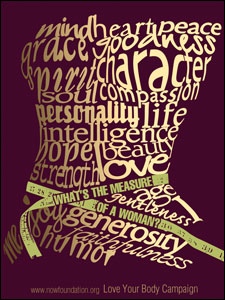This week is National Eating Disorders Awareness week and the National Eating Disorders Association has asked people to do just one thing to support awareness. Today, I wanted to blog about a common misconception that exist in communities of color: the idea that eating disorders are just a white girl thing. They’re not. They are not even just a girl thing.
Today, it is believed that at least 10 million women and girls and 1 million men and boys suffer with eating disorders. I say believed because, too often, eating disorders are suffered in secret.
When I was writing Hijas Americanas, I had several Latina women approach me about sharing their experiences with eating disorders in the book. They wanted to share their stories because, as Penelope, 26, put it:
“Historically speaking, weight-consciousness is not the province of sexy, bold Latinas. But we exist. We are out there, but I have never met another Latina who admitted to having bulimia. For years, I have wanted to tell my friends. I have told them everything about me, except for this, because it is not something that is discussed. It is a white-girl thing.”
Individuals with eating disorders too often suffer in silence because they feel they are alone and that an eating disorder is something for which they should feel shame. Neither is true. Penelope’s story, and others like her who bravely shared their experiences with anorexia and bulimia with me, reminds me that women of color feel as if their ethnicity is a further complicating factor in getting help. So, for today, I want to encourage people of all backgrounds and any gender to talk about what they face in terms of the pressures that they feel with regard to body image, beauty standards, control, etc. Giving voice to our struggles- whether or not those struggles involve an eating disorder- claiming the realities of our journey, is the best way to face, confront, and alter them. Sometimes, we think telling our secret is the worst thing we can ever do. What I have seen, however, is that it can actually be the best thing, freeing us from the grip of the secret and taking us to a new frontier that is tinged with hope and possibility. In fact, going a step further and getting professional help can be one of the greatest acts of self-love and self-care.
If you are interested in learning more about women of color and eating disorders, I hope you’ll check out this information from NEDA.



